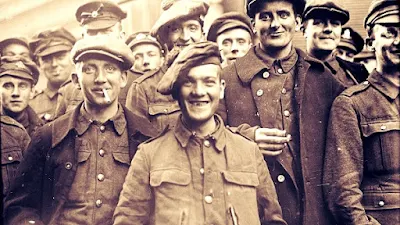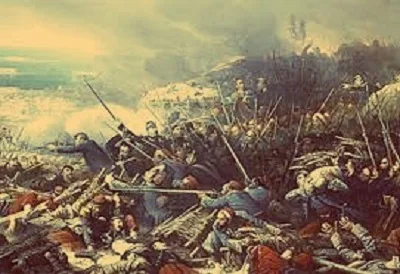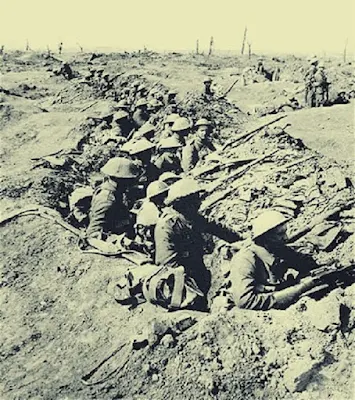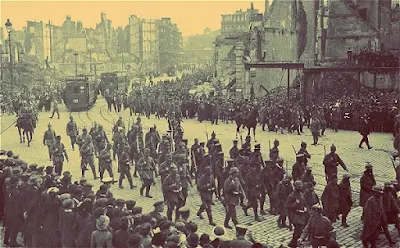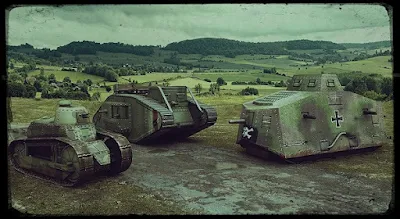World War I
- The beginning of the First World War was in 1914, following the assassination of Archduke Franz Ferdinand, and this war continued until 1918, and Germany, Austria-Hungary, Bulgaria, and the Ottoman Empire (the Axis Powers) fought against Britain, France, Russia, Italy, Romania, Japan, and the United States of America (the Allied Powers), and it is noteworthy that this war witnessed unparalleled levels of massacres and destruction, due to the modern military technologies used and trench wars, which led to the victory of the Allied countries, and the death of more than 15 million A person including soldiers and civilians and more than 20 million injuries.
- By The Way after the end of World War I, the Spanish flu spread and caused the death of about 50 million people in the world.
Balqan War
- At the beginning of the twentieth century, European countries struggled to control the "Balqan region" and expel "the Ottoman Caliphate" from it.
- The First Balqan War broke out in October 1912, between the Ottoman Empire and "the Balqan Federation" Bulgaria, Serbia, Greece and Montenegro with the support of Russia, and ended on May 30, 1913, with the signing of the Treaty of London.
- The war led to the defeat of the Ottoman Empire and the fall of more than 125,000 fighters from the Ottoman army, 40,000 fighters from the Balkan army, the loss of most of its territory in Europe by the Ottoman Empire, and the declaration of the establishment of the Albanian state.
The Assassination Of Archduke "Franz Ferdinand" And His Wife
- After the assassination of Archduke "Franz Ferdinand" Crown Prince of "Austria-Hungary" with his wife "Suffi" by a Serbian student named "Gavrilo Princip" on June 28, 1914 during their visit to Sarajevo, Austria issued an ultimatum to Serbia on July 23, 1914 requesting approval within 48 hours of 10 demands, and although Serbia agreed to most of these demands, Austria considered them a refusal and declared war on Serbia on July 28 despite international efforts to resolve the dispute.
- In addition to the conflicts between Germany, Italy, France and Britain over North African countries to win, of course, the Suez Canal, natural gas and oil.
All of the above were among the most important reasons for the outbreak of World War I
- After Austria declared war on Serbia, the mechanism of European alliances began to interact, as Russia supported Serbia and declared war on Austria because of its desire to control the Straits, other than its resentment of the German prince who rules Albania, and military cooperation between Germany and the Ottoman Empire, which made Germany declare war on Russia on August 1, 1914, and two days later on France.
- Germany's motives for the war were its desire for political and economic gains, while for Britain it wanted to eliminate German and Russian expansion, and on August 4 it also declared war on Germany.
- On August 6, the Austrian Empire (Austria-Hungary) declared war on Russia, followed by France and England declaring war on Austria on August 10 and 11.
- Two groups were formed, the first called the "Allied Forces" (Triple Entente) that included France, Britain, Serbia, Montenegro and Belgium, and the second was the "Center countries" Or "the Axis Power" formed by Austria, Hungary and Germany, then Japan joined the Allies because of its desire to extend its influence over China, and control the Chinese region of "Shantung", which was under German control, so China in turn joined the "the Axis Countries" side.
- The Ottoman Empire's position was neutral first, but it was forced to stand by the central countries on November 3 in defense of its borders, which are threatened by the influence of some countries from the side of the "allies", and alliances expanded with the expansion of the war circle, either in order to control or a desire for independence.
Battles of 1915
- The Germans were able in (1915 AD) to achieve more victories over the Allies, so they defeated the Russians in the battle of "Gorlis Tarnau" in (May 1915 AD) and occupied Poland and most of the cities of Lithuania, and tried to cut the lines of communication between the Russian armies and their bases to eliminate them, but the Russians achieved some partial victories over the Germans, costing them 325 thousand Russian prisoners, which after which the Russian army could not recover its strength.
- German success over the Russians led to the subjugation of the Balkans, and Austrian and German forces crossed the Danube to fight the Serbs and inflict a severe defeat on them.
- That year, the Germans were able to achieve impressive victories on some fronts, while the German front stood firm against the attacks of the French and British armies, despite the appearance of alarm in English public opinion about the shortage of ammunition for the British army and its demand for the formation of a coalition ministry, and there were changes in the Russian military leadership.
Battles of 1916
- In 1916, two major battles took place on French soil, one of which lasted seven months, and the other four months, namely the battle of "Verdun" and "The Somme", the Germans lost in the first battle (240) thousand dead and wounded, while the French lost (275) thousand. As for the Battle of the Somme, during which the Allies were able to force the Germans to retreat a hundred square miles.
- And this battle eliminated the old German army, and dependence on recruits became young, and the British army lost in this battle sixty thousand dead and wounded on the first day. The Russians were able during that year to carry out a campaign against Austria led by General Brusilov, and captured (450) thousand prisoners of Austrian and Hungarian forces; this victory encouraged Romania to declare war on Austria-Hungary, Germany responded by declaring war on it, and the Germans swept the Romans in six weeks and entered Bucharest.
Submarine warfare
- In that year, a naval war took place between the Germans and the English known as "Gatland", during which the German fleet came out of its ports to fight the English fleet in the hope of lifting the naval blockade imposed on Germany.
- And the Germans triumphed over the English and inflicted heavy losses on the English fleet.
- And the Germans resorted in that period to "submarine warfare" with the aim of sinking any merchant ship without warning, to starve Britain and force it to surrender.
- But this war provoked the United States, and pushed it to enter the war in (April 1917), especially After learning that the Germans had made an attempt to entice Mexico to attack the United States in exchange for the annexation of three American states. Before entering the war, the United States embraced the Monroe doctrine, which is based on America's isolation in its foreign policy from Europe, and not allowing any European country to interfere in American affairs, but American leaders saw that it was in their country's interest to benefit from the war by entering it.
- The Allies took advantage of the enormous American capabilities and supplies to strengthen their war effort, and were able to tighten the blockade on Germany in a way that weakened it.
1917 And Battle of Passchendaele
- Among the important events witnessed in (1917 AD) was the establishment and success of the Bolshevik Revolution in Russia, the signing by the Bolsheviks of the Peace of Brest-Litovsk with the Germans in ( 1918 AD), and Russia's exit from the war. That year also saw the French carry out a major attack on German forces with the help of English forces, but this attack failed and the French suffered horrific losses that caused a rebellion in their ranks, and changes were made in the ranks of the French leadership.
- The British saw the diverting of the Germans' attention to the British front, so the battle of "Passchendaele" took place, in which the British lost 300 thousand soldiers between dead and wounded, and multiple calamities occurred among the Allies on the Russian, French and Italian fronts, despite the victories achieved by the Allies over the Turks and their entry into Iraq and Palestine.
End of World War I
- Russia's exit from the war encouraged the German leadership to take advantage of (400) thousand German soldiers who were on the Russian front and direct them to fight the English and French, and the Germans were able to destroy the British Fifth Army in (March 1918 AD), and the violent battles of the two sides that caused heavy losses in lives, and money, and the cost of the war in that year was estimated at about ten million dollars every hour.
- The Allies began to regain their strength and launch great attacks on the Germans that ended the war, and it was known as the "Second Battle of the Marne" (July 1918 AD) and the day (August 8, 1918 AD) was a black day in the history of the Germans, as they suffered terrible defeats in front of the British and the Allies, and Germany began to collapse and capture about a quarter of a million Germans in three months, and British forces entered all German lines, and reached northern France, and the rest of the Allied forces reached France.
- Germany was swept by a violent political crisis that escalated with successive military defeats on the battlefields, so Germany asked for an armistice unconditionally, so the Allies refused to negotiate with the existing imperial government, and this caused the establishment of the republic in Germany after the resignation of the German emperor, and the armistice that ended the war occurred on (November 11, 1918 AD) after four and a half years of fighting, which killed more than ten million military personnel, and wounded (21) million others.
- The war ended with the loss of Germany and the Axis Powers at the Battle of the Second Marne in 1918AD, and the war was officially declared over after Germany signed its surrender.
- the war caused the disintegration of the Ottoman Empire after the 1920 treaty.
- The area of some European countries has also increased and the area of other countries has decreased, for example: the area of France, Britain, Belgium, and Italy has expanded. Austria, Germany, and Bulgaria have shrunk in size.
- Some international organizations were also established and established, such as the League of Nations, whose charter was decided in 1919 AD, and several Arab countries signed under the mandate, and this was according to the Sykes-Picot Agreement, which was approved by the victors of the war.
- Thousands of homes, factories and agricultural land were destroyed during World War I, in addition to damage to sectors such as the railway sector.
- In that war, countries spent exorbitant amounts of money, and of course taxes rose exaggeratedly, which led to the spread of poverty, epidemics, a decrease in the standard of living, and the deterioration of industrial and agricultural production. To get out of this predicament, countries were forced to borrow from the United States of America, and consequently, Europe lost its economic position in favor of countries that benefited from the war, such as Japan, the United States of America, who developed their industry.
But for the soldiers, coming back from the war meant life to them in its entirety.
What started World War 1?Why did Germany start ww1?
What was World War 1 about short summary?
What happened in World War 1?
world war 1 summary
who won world war 1
how many people died in ww1
what caused ww1
world war 1 countries
ww1 timeline
who were the allies in ww1
how long was world war 1
who won world war 1
how many people died in ww1
what caused ww1
world war 1 countries
ww1 timeline
who were the allies in ww1
how long was world war 1

